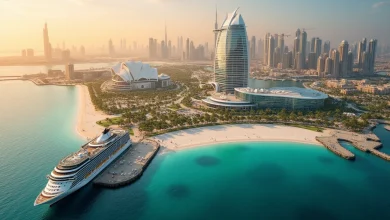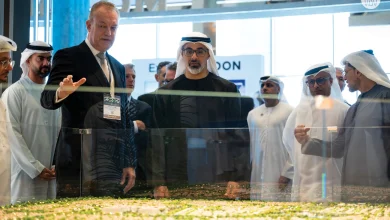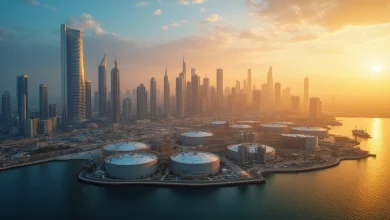
The Rise of Cross-Border Investments and Its Effects on the UAE Real Estate Industry
Impact on Property Prices
The rise of cross-border investments in the UAE real estate industry has had a significant impact on property prices. With an influx of foreign capital, there has been an increase in demand for properties, leading to a rise in prices. This effect is particularly evident when comparing property prices before and after international partnerships were established. The introduction of new investors and buyers from different countries has created a competitive market, driving up property values and making it more challenging for locals to afford homes.
With international collaborations comes access to global markets and economies. This allows for more diverse investment opportunities, resulting in increased competition among developers vying for foreign investments. As a result, we have seen a shift towards high-end luxury properties that cater to the preferences of wealthy international buyers. However, this also means that affordable housing may become scarce as these developments focus on catering to the demands of higher-income individuals or companies looking to invest in commercial properties.
While foreign investments have positively impacted the growth and development of the UAE real estate sector, they have also led to rising property prices that may pose challenges for local residents. It is essential for policymakers and developers alike to find ways to balance these effects and ensure sustainable growth within the market.
Development of Infrastructure
One of the major benefits of cross-border investments in the UAE real estate industry is the significant improvements in infrastructure. With increased foreign capital, there has been a surge in construction projects aimed at developing and enhancing the country’s infrastructure. This includes upgrading existing roads and highways, building new transportation systems such as metro lines and tram networks, and expanding airports to accommodate growing numbers of tourists.
One notable example of this is the development of Dubai’s Al Maktoum International Airport, which was launched with support from international investors. The airport is set to become one of the largest in the world, capable of handling over 200 million passengers annually. This will not only boost tourism but also attract more businesses and investors to Dubai.
In addition to transportation infrastructure, international partnerships have also led to advancements in utilities and energy sources. The UAE has invested heavily in renewable energy projects such as solar farms and wind turbines through collaborations with companies from countries like China, Japan, Germany, and France. These initiatives not only contribute towards sustainable development but also reduce reliance on traditional fuel sources.
International collaborations have brought innovations in technology that have improved overall efficiency within the real estate sector. For instance, smart home technologies are becoming increasingly popular among developers looking to cater to high-end buyers who value convenience and luxury living experiences.
Overall these developments have greatly enhanced the quality of life for residents while also positioning UAE as a global leader when it comes to modern infrastructure standards. However, it is crucial for policymakers to ensure that these upgrades benefit both locals and foreigners alike by providing affordable housing options near these developments for those who may be negatively impacted by rising property prices.
Diversification of Real Estate Market
The influx of cross-border investments has also led to the diversification of the types of properties available in the UAE real estate market. With international partnerships, developers have been able to introduce new concepts and designs that cater to different preferences and demands. This has not only expanded the options for buyers but also created a more competitive market where developers strive to offer unique and innovative properties.
One example is the rise of mixed-use developments, which combine residential, commercial, and recreational spaces within one project. These developments appeal to both investors looking for rental income opportunities as well as individuals seeking convenience and a holistic lifestyle. Additionally, there has been an increase in luxury properties such as branded residences or hotel apartments that cater specifically to high-net-worth individuals from around the world.
This diversification of property types has also had a positive impact on overall market stability and growth. By offering a variety of options for investment, it reduces risks associated with relying solely on one type of property or sector. It also attracts a diverse range of investors who may bring different perspectives and expertise into the industry.
These collaborations have opened up opportunities for local developers to learn from their international counterparts’ best practices and adopt them in their projects. This exchange of knowledge can lead to improved quality standards in construction, design, sustainability measures, among others.
However, it is essential for policymakers to monitor this diversification closely and ensure that it does not lead to oversupply or neglecting affordable housing needs within the country’s population.
Cross-border investments have greatly impacted various aspects of the UAE real estate market – from prices and infrastructure development to property diversity – leading towards its growth into a global hub for business and tourism. While there are challenges posed by rising prices that must be addressed by policymakers effectively, these partnerships continue contributing positively towards sustainable economic development in the country.
Technology Advancements
The implementation of advanced technologies in the real estate sector has greatly improved the overall experience for buyers and investors in the UAE. One of the most significant benefits is increased efficiency in property transactions. With advancements such as online portals and virtual tours, buyers can now easily search for properties and view them from anywhere in the world, saving time and resources.
Additionally, technology has also made it easier to conduct due diligence on properties through tools like artificial intelligence (AI) that can analyze market data and predict future trends. This allows investors to make more informed decisions based on accurate information.
Technology has also enhanced transparency within the market by providing access to real-time data on property prices, sales history, and other relevant information. This level of transparency builds trust among buyers and investors, leading to a more stable market.
Another advantage of advanced technology is its contribution towards sustainability measures within the real estate industry. For instance, smart home technologies allow for better energy management and conservation while reducing carbon footprint. Similarly, construction materials are being developed using eco-friendly techniques that promote sustainable development practices.
With technological advancements come opportunities for innovation in financing options such as crowdfunding platforms or blockchain-based transactions. These new methods provide alternatives for both developers looking for funding sources as well as buyers seeking flexible payment plans.
Technology has revolutionized the real estate industry in UAE by making processes more efficient and transparent while promoting sustainability measures. It continues to attract foreign investments into this thriving market while providing diverse options for both buyers and developers alike.
Challenges and Limitations
While international partnerships have brought many benefits to the UAE real estate market, they also come with potential challenges and limitations that must be addressed. One major challenge is the language barrier and cultural differences between foreign investors and local developers. This can lead to miscommunication or misunderstandings in expectations, which may hinder the success of a partnership. To overcome this, it is crucial for both parties to invest time in understanding each other’s culture and communication styles before entering into any agreements.
Another limitation is the potential for political instability or changes in regulations that could impact cross-border investments. This risk can make some investors hesitant to enter into long-term partnerships, especially if they are unfamiliar with the country’s political climate. To mitigate this, policymakers must ensure a stable regulatory environment that encourages foreign investments while protecting local interests.
Additionally, different legal systems and procedures across countries can also present challenges when it comes to conducting business transactions smoothly. It is essential for partners to establish clear guidelines and protocols from the start to avoid any conflicts or delays in decision-making processes.
To overcome these challenges effectively, open communication channels between all stakeholders involved are crucial. Regular meetings should be held where issues can be discussed openly, and solutions can be found collaboratively.
Having a strong support system through government agencies such as investment promotion bodies or trade organizations can facilitate smoother collaborations by providing guidance on regulations and offering resources for resolving conflicts.
While there may be potential obstacles in implementing international partnerships within the UAE real estate market due to cultural differences or regulatory uncertainties, these challenges can be overcome through effective communication strategies and support from relevant authorities.
Case Studies
One successful international collaboration in the UAE real estate sector is the partnership between Dubai-based developer Emaar Properties and Chinese state-owned construction company China State Construction Engineering Corporation (CSCEC). This collaboration has resulted in the development of several iconic projects, including Burj Khalifa, the world’s tallest building, and Dubai Creek Tower, set to become the new tallest tower globally. These developments have not only put Dubai on the map as a global leader in architecture and engineering but have also attracted significant investments from Chinese buyers.
The impact of this partnership can be seen through increased property prices in these areas as well as an influx of tourists from China. It has also opened up opportunities for other Chinese companies to enter into partnerships with local developers, further boosting economic growth.
Another successful example is Abu Dhabi’s partnership with South Korean conglomerate Samsung C& T for its ambitious Saadiyat Island project. This collaboration has led to the development of world-class cultural institutions such as Louvre Abu Dhabi and Guggenheim Abu Dhabi on Saadiyat Island. These developments have not only added value to the city’s tourism industry but have also elevated its status as a global cultural hub.
This partnership has paved the way for more collaborations between South Korean companies and Emirati developers in various sectors, promoting economic diversification.
Overall, these successful international collaborations have had a significant impact on both cities’ real estate markets by attracting foreign investments and enhancing their global reputation while fostering economic growth within their respective countries.
Future Prospects
The UAE real estate sector is continuously evolving, and with it comes the potential for more international collaborations that can further enhance its growth. One area that has been gaining momentum in recent years is sustainable development. With a growing focus on environmental conservation and sustainability measures, there is an opportunity for partnerships between local developers and foreign companies specializing in eco-friendly technologies or green building techniques.
This could lead to the development of more sustainable communities and buildings, which not only benefit the environment but also attract environmentally conscious buyers and investors. It could also position the UAE as a leader in sustainable development globally.
Another potential collaboration that could have a significant impact on the future of UAE’s real estate market is within the technology sector. As advancements such as artificial intelligence (AI), smart home technologies, and blockchain continue to transform traditional processes within the industry, there may be opportunities for partnerships with tech companies from countries known for their expertise in these areas.
These collaborations could lead to even more efficient operations within the real estate sector while attracting tech-savvy investors who are drawn to cutting-edge developments.
Moreover, given the increasing demand for affordable housing options within major cities like Dubai and Abu Dhabi, there is room for partnerships focused on developing affordable housing projects using innovative solutions such as 3D printing or modular construction methods. This would not only address pressing social issues but also create investment opportunities catering to this specific market segment.
In terms of predictions for the future of UAE’s real estate sector overall, it seems likely that international collaborations will continue playing a crucial role in its growth trajectory. The country’s strategic location at the crossroads of three continents makes it an attractive hub for global investments across industries – including real estate.
Additionally, with mega-events such as Expo 2020 Dubai drawing attention from around world towards UAE’s economic potential, we can expect an increase in foreign investments into various sectors including real estate post-Expo
One key finding from this discussion is the significant impact that international collaborations and partnerships have had on the UAE real estate sector. These collaborations have not only brought in foreign investments but also facilitated economic growth, promoted sustainability measures, and elevated the country’s global reputation.
The success of these partnerships can be attributed to effective communication strategies, support from government agencies, and a stable regulatory environment. By addressing potential challenges such as cultural differences and legal procedures upfront, these collaborations have been able to overcome obstacles and achieve mutual success.
By showcasing successful examples of international partnerships within the UAE real estate sector, this discussion highlights the potential for even more collaborations in various areas such as sustainable development and technology.
It is evident that international financial collaborations play a vital role in shaping the future of the UAE real estate market. As developments continue to evolve with advancements in technology and changing market demands, we can expect to see an increase in cross-border partnerships driving innovation and growth within the industry.
The significance of international financial collaborations for the UAE real estate sector cannot be overstated. These partnerships bring numerous benefits such as attracting foreign investment, promoting economic diversification, and facilitating sustainable development while elevating its global reputation. Post-Expo 2020 Dubai, the country’s strategic location, coupled with its stable regulatory environment, is expected to attract even more foreign investments into its thriving real estate market. With continued focus on fostering strong relationships between local developers and foreign companies, the future prospects for this dynamic industry look promising.






